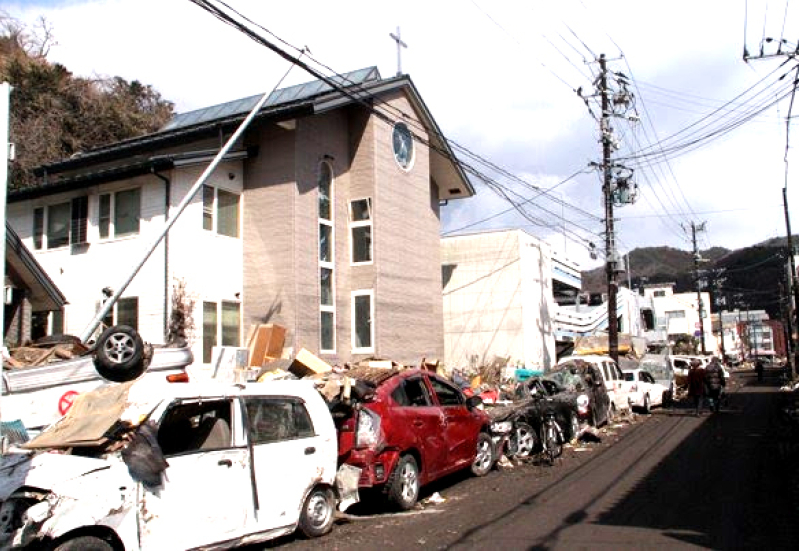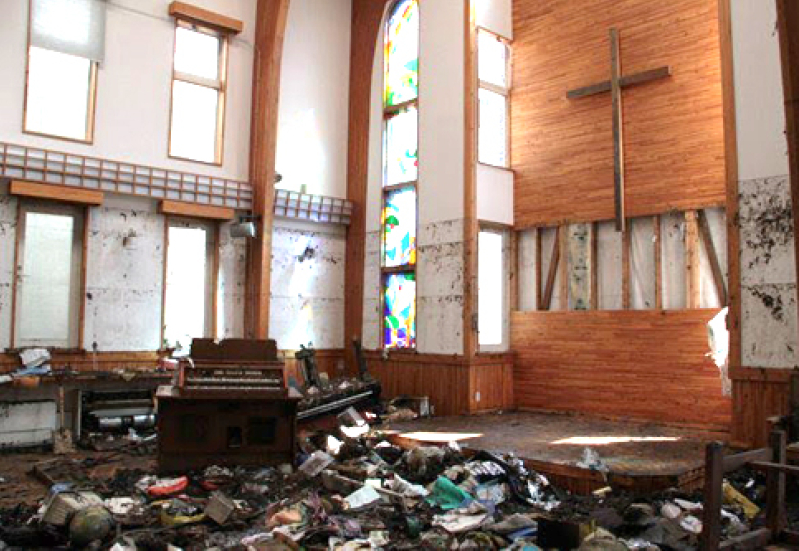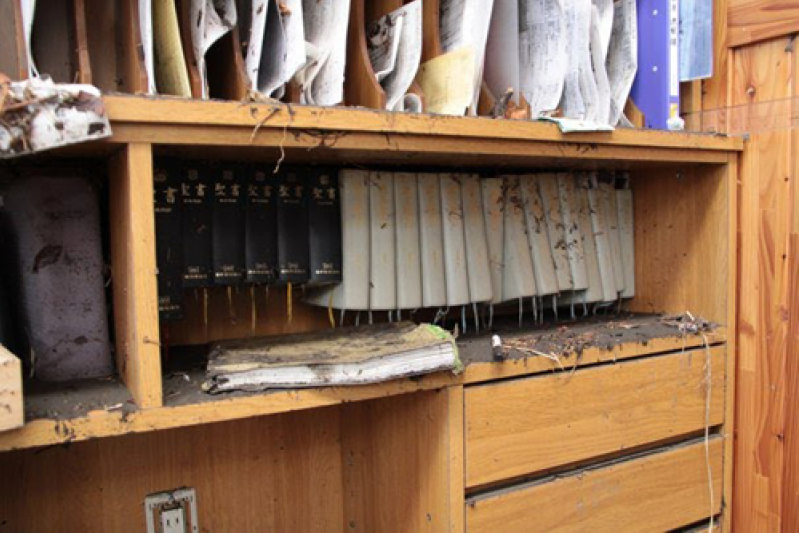


Two workers at Japan’s stricken nuclear facility were hospitalized Thursday after being exposed to high levels of radiation, officials at the nation’s nuclear safety agency said. A third worker was also exposed but did not require hospitalization.
Water supplies and vegetable crops in the nearby region were reported to be contaminated by the radiation leakage.
According to a prayer request letter issued by Minami Chapel in Japan, the leader of the Fukushima nuclear facility cooling process is a Christian. In addition, several of the 50 workers belong to a 60 member church in Fukushima.
In Fukushima First Bible Baptist Church’s prayer letter, it stated that 5 members of the church are working inside the No. 1 and No. 2 reactors to prevent overheating through the cooling process.
According to reports, a 30 year old man who had a night shift at the nuclear facility on the day of the earthquake was prepared to return to the plant, but decided not to after his wife stopped him. Their entire family then sought refuge at Aizu Chapel’s mission center in Yonezawa, Yamagata Prefecture.
On March 17th, this man accepted Jesus Christ as his savior at the church where he sought refuge. Afterwards, he questioned himself on why he is not at the nuclear plant while all his colleagues are maintaining their post until the end.
The next day, he said good bye in tears to everyone at the church and returned to the power plant at Fukushima.
His wife said, “Although I told my husband that I believe God guides us absolutely, I am still very worried. My heart felt like cut by a knife and pierced by a needle. I am the only one left to take care of children now. March 20 is my husband’s birthday, and he is spending his birthday this year inside the nuclear power plant.”
Rev. Akira Sato, senior pastor of Fukushima First Bible Baptist Church, said in a letter posted on the earthquake disaster page of Hokkaido Christian Mission Network that he is deeply worried about those who are elderly and sick and asks for fervent prayers.
Sato called for fervent prayers that church can survive the crisis and the work of mission would not be stopped, that they would rise again, radiation leak would be stopped.
“The worst possible scenario would be that people would never be able to go back to their town and homes, and that the church would be closed down and the history of mission in this region would end. Please pray this wouldn't happen. Please pray that people would be able to come back to the city and church doors would be opened again and we can praise and worship the Lord there again.”
Chinese Christian Evangelical Association in Taiwan issued a prayer requests in their news release asking that Christians can pray that God can revert the situation because of the Christians working inside the reactors.
Similarly, San Francisco-based Chinese pastor Yuan Zhiming urged for the Chinese Christians to put down the historical enmities between China and Japan and care for Japan with love for the sake of the gospel.
The death toll from the March 11 earthquake and tsunami climbed to 9,737, the National Police Agency said, and 16,501 people are still unaccounted for. Strong aftershocks continued, with a magnitude 6.1 quake rocking Miyagi prefecture shortly after 5 p.m. Some 220,000 people remain in emergency shelters.
Despite the hospitalizations of the Fukushima workers, some progress at the plant was reported Thursday. Lights were turned on at the control room of reactor No. 1
The World Bank says a slowdown in Japanese economic growth following the earthquake, tsunami and nuclear crisis should only be temporary, despite a damage bill of up to $US235 billion, reported the ABC News.
Below is the English translation of Rev. Sato’s report "Refugee Life":
I give thanks for your prayers. On March 15th at one in the morning, my wife and I, having joined a truck which was full of relief supplies, stopped at a local store, taking anything we could get our hands on from the shelves, buying it all and filling our trunk and back seat area; with these supplies we headed north straight for Fukushima. Though on the way we saw sink holes in the road and houses that had partially collapsed we moved smoother than we expected, yet we also heard via the media about another explosion at the nuclear power plant and the leakage of radioactivity and added to that we heard reports of the enlarging of the evacuation area, prohibitions regarding entering the evacuation area and the like, so though perplexed we chose the inland road. It took 10 hours, but finally we arrived safely in Aizu at the refuge shelter (a church) at 11o’clock in the morning. Hallelujah!
About one-third of the 60 church members came from near the nuclear power plant, the radioactivity contamination testing not yet done they then joined us in the afternoon. At that time when we immediately started with a worship service, I began to hear their sobbing voices and I realized just how much each had passed through upon arriving here. In the evening we went to a nearby hot springs and shared the joy of bathing for the first time in five days. We were deeply touched by the kindness of the Aizu Church. One by one, trembling with emotion, I saw them call out and embracing each other saying “Your alive!” and the flow of tears started flowing again.
And all that to realize, they have just started Gypsy like wanderings, no longer having a home, and I ask these who left with just the clothes on their backs, “Do you need to launder anything?” and when they answered “We have NOTHING to wash.” I could not find the words to respond to them. When I asked, I found that some of them have had nothing to drink or eat for 3 days; others had spent those days numb with cold. This drifting lifestyle has just started with the pressing need to secure gasoline and a place to stay. This large family of 60 people trying to live together, and making matters worse this is a nationwide emergency in which it is hard to make decisions, so we have decided to head north preparing to establish ourselves, anticipating a protracted situation. Perhaps as a result of exhaustion, there are those who have received I.V. in the hospitals, from the old to the babes as God’s people after the exodus, we will be traveling in the “wilderness”. Will we ever be able to return to that town? Will it become ruins? Will we be able to return in 2 or 3 months? When will we again be able to open our front doors to the church and our homes? All seems to be a drift, in the midst of feeling our way we unite our strength guided by the pillar of fire and cloud, no other option but to wander.
The day before we left, the police gave a special “disaster relief” certification for our car so we were able to get a full tank of gas. Tomorrow the Yonezawa Church will pay a great sacrifice by receiving us in their building. We give thanks for their compassion and sympathy, and we can do nothing but kindly accept this means of survival. It is just like living out a scene in a drama, I never thought I would have this kind of experience in my lifetime. O Lord, may you protect this flock which is precious in your eye, which has begun to wander scattered about in various places like the “Remnant” like a people left behind.
Psalm 121:1-4
I lift up my eyes to the hills. From where does my help come? My help comes from the LORD, who made heaven and earth. He will not let your foot be moved; he who keeps you will not slumber. Behold, he who keeps Israel will neither slumber nor sleep.






